21世纪大学英语英语课文讲解unit1( B )
- 格式:doc
- 大小:74.00 KB
- 文档页数:7
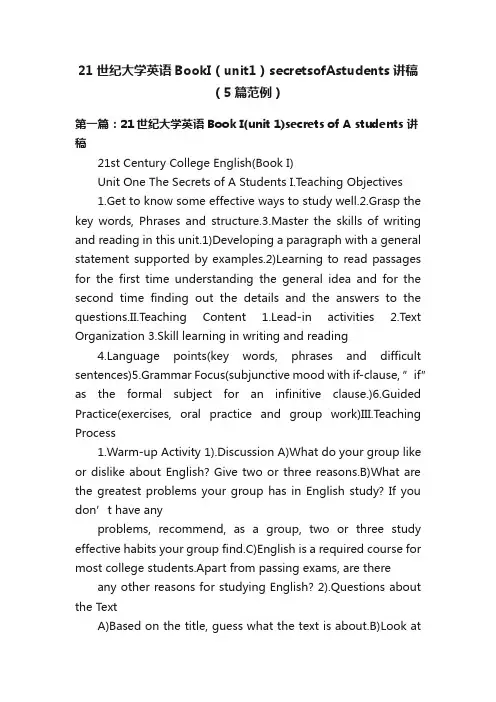
21世纪大学英语BookI(unit1)secretsofAstudents讲稿(5篇范例)第一篇:21世纪大学英语Book I(unit 1)secrets of A students 讲稿21st Century College English(Book I)Unit One The Secrets of A Students I.Teaching Objectives1.Get to know some effective ways to study well.2.Grasp the key words, Phrases and structure.3.Master the skills of writing and reading in this unit.1)Developing a paragraph with a general statement supported by examples.2)Learning to read passages for the first time understanding the general idea and for the second time finding out the details and the answers to the questions.II.Teaching Content 1.Lead-in activities 2.Text Organization 3.Skill learning in writing and readingnguage points(key words, phrases and difficult sentences)5.Grammar Focus(subjunctive mood with if-clause, ”if” as the formal subject for an infinitive clause.)6.Guided Practice(exercises, oral practice and group work)III.Teaching Process1.Warm-up Activity 1).Discussion A)What do your group like or dislike about English? Give two or three reasons.B)What are the greatest problems your group has in English study? If you don’t have anyproblems, recommend, as a group, two or three study effective habits your group find.C)English is a required course for most college students.Apart from passing exams, are there any other reasons for studying English? 2).Questions about the TextA)Based on the title, guess what the text is about.B)Look atthe subheadings, 1-8, in the text.Which of these activities have you already done? In which areas do you feel you need improvement?C)Are there any “secrets” to your own success as a student? In other words, do you have any special study techniques which have been very successful for you? 3)Background InformationA)grading systemGrading is just a means for teachers to measure and assess students study.There ususlly are two grading system: the five-grade-marking system and percentage scales.(五分制和百分制)Schools, colleges and universities in Great Britian and the United States commonly use lettergrades to indicate the quality of a student’s academic performance: A(excellent), B(good), C(average), D(below average), and F(failing).In the United States, work rated C or above is ususlly required of an undergraduate student to continue his / her studies;work rated B or higher is usully required of a graduate student to continue.In percentage scales, 100 percent is the highest mark, and 70 percent(or 65 percent)is usually the lowest passing mark.B).students at universityA university student who has not yet taken his or her first, or “bachelor’s” degree is an undergraduate.In the United States, a first-year student at a college or university, and in a high school as well, is called a freshman, a second-year student a sophomore, and a third-year student a junior, and a fourth-year student a senior.A graduate is a person who has completed a university degree course while a posrgraduate(or graduate in the United States)is a person doing studies that are done at a university after one has received a first degree.C)speed-reading Also known as rapid reading, speed-reading is a method of reading rapidly byskimming and scanning.The aim is to increase the number of words read in a certain length of time, as well as th e reader’s comprehension of the text.2.Text OrganizationPart I(para.1-para.3)presenting the importance of the study skills by two specific examples.Part II(para.4-para.12)giving the 8 study skills concretely 3.Skill learning in writing and reading1)Reading skill: read the assigned passage twice.The first time concentrate on understandingthe general ideas and on the second reading concentrate on the details and any questions in your mind after the first reading.please take Text B and Text C as your reading materials and finally you will become an efficient reader.2)Writing skill: The type of writing is an exposition.This text is a typical “how-to-do-things essay”.This kind of article is ususlly divided intotwo parts: Part 1, the importance of doing this;Part 2, the concrete methods or procedures of doing it.And the second part is the main body of the article.Generally speaking, there’s a topic sentence at the beginning of the text to express the thesis and a conclusive sentence in the end.In this text, after the examples at the beginning, the author tells us the topic sentence “The students at the top of the class get there by mastering a few basic techniques that others can easily learn.”.To match the topic sentence, the author gives us the conclusion sentence “After all, the secrets of A students are not so secret.You can learn and master them and become an A student, too.”nguage Points 1)perform Para.2 vt/vi.A))do;accomplish;carry out.B))act, play, sing or do(tricks)before audience.eg.When will the play be ~ed?The surgeon was ~ing a dangerous operation.performancen.carrying, acting out, playing musiceg.He is excellent in the ~ of his duties.His ~ of Hamlet was very good.performer n.the person who act, play, practice and carry out [C] perform one’s jobperform an experimentperform calculationperform an operationa good/bad performanceperform a trickperform one’s promisegive two performances a day 2)high-achieving para.3 adj.high-scoring/getting high marks[C] high-achieving students[O] underachieving adj.lower-scoring adj.3)concentratepara.4 vt/vidirect(attention ,efforts, etc)to a point of focuseg.He ~d his energies on studying.The soldiers ~d outside the town for the attack.concentrated adj.asembled, intense, be absorbed inconcentration n.getting involved in;people and soldiers absembling;eg.He lacks ~.[C] concentrate one’s attention on/upon/towards sth.concentrate one’s efforts on/upon/ towards sth.concentrate one’s thoughts on/upon/towards sth.concentrate the troopsconcentrated juiceconcentration camp[S] focusv.A))~(on),(cause to)come together at a focus;adjust(an instrument, etc.)so that it is in focus B))~ on, concentrate focuson sth.focus one’s anger on sth.focus one’s attention/thoughts on a problem focus the lens of a microscope4)interruptionn.break;disruptioneg.Numerous ~s have prevented me from finishing the work.I get too many ~s in my work.interrupt v.A)break the continuity of B)break in upon(a person’s action, speech, etc.) eg.The war ~ed the flow of commerce between the two countries.Traffic was ~ed by floods.Those trees are growing so high that they ~ the view.interrupter n.[C] an annoying interruptionwithout interruption service interruptiontemporary interruptioninterruption of telephone communication 5)ignorevt.Take no notice of;refuse to pay attention to para.5eg.He ~d my advice.The driver ~d the traffic light.ignorance n.eg.His failure resulted from his ~.Do you mean you were in complete ~ of the fact?ignoranta.ill-informed, lacking in knowledge, sillyignorantly adv.eg.I’m ~ about politics.I was ~(of the fact)that the boss could be so strict.[C] ignore something ignore somebodyignore personal dangerbe ignorant of / be in ignorance of something[P] Ignorance is bliss.无知便是福。
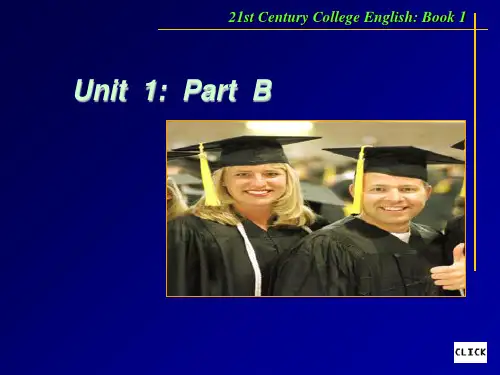
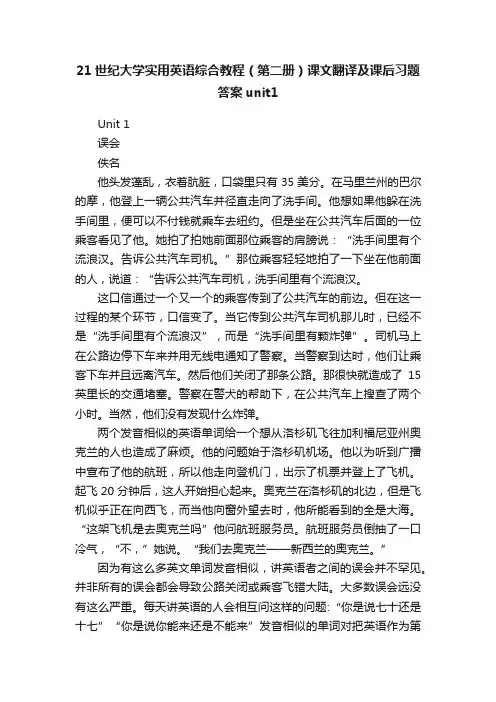
21世纪大学实用英语综合教程(第二册)课文翻译及课后习题答案unit1Unit 1误会佚名他头发蓬乱,衣着肮脏,口袋里只有35美分。
在马里兰州的巴尔的摩,他登上一辆公共汽车并径直走向了洗手间。
他想如果他躲在洗手间里,便可以不付钱就乘车去纽约。
但是坐在公共汽车后面的一位乘客看见了他。
她拍了拍她前面那位乘客的肩膀说:“洗手间里有个流浪汉。
告诉公共汽车司机。
”那位乘客轻轻地拍了一下坐在他前面的人,说道:“告诉公共汽车司机,洗手间里有个流浪汉。
这口信通过一个又一个的乘客传到了公共汽车的前边。
但在这一过程的某个环节,口信变了。
当它传到公共汽车司机那儿时,已经不是“洗手间里有个流浪汉”,而是“洗手间里有颗炸弹”。
司机马上在公路边停下车来并用无线电通知了警察。
当警察到达时,他们让乘客下车并且远离汽车。
然后他们关闭了那条公路。
那很快就造成了15英里长的交通堵塞。
警察在警犬的帮助下,在公共汽车上搜查了两个小时。
当然,他们没有发现什么炸弹。
两个发音相似的英语单词给一个想从洛杉矶飞往加利福尼亚州奥克兰的人也造成了麻烦。
他的问题始于洛杉矶机场。
他以为听到广播中宣布了他的航班,所以他走向登机门,出示了机票并登上了飞机。
起飞20分钟后,这人开始担心起来。
奥克兰在洛杉矶的北边,但是飞机似乎正在向西飞,而当他向窗外望去时,他所能看到的全是大海。
“这架飞机是去奥克兰吗”他问航班服务员。
航班服务员倒抽了一口冷气,“不,”她说。
“我们去奥克兰——新西兰的奥克兰。
”因为有这么多英文单词发音相似,讲英语者之间的误会并不罕见。
并非所有的误会都会导致公路关闭或乘客飞错大陆。
大多数误会远没有这么严重。
每天讲英语的人会相互问这样的问题:“你是说七十还是十七”“你是说你能来还是不能来”发音相似的单词对把英语作为第二语言的人来说,特别容易让人混淆。
一天早晨,一位生活在美国的韩国妇女到上班地点时,她的老板问她:“你拿到盘子了吗” “没有……”她回答说,心里却在纳闷,不知道他到底是什么意思。
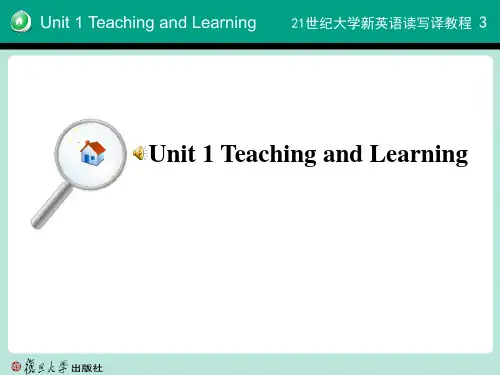
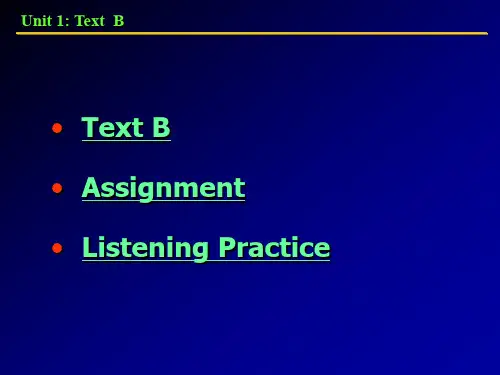
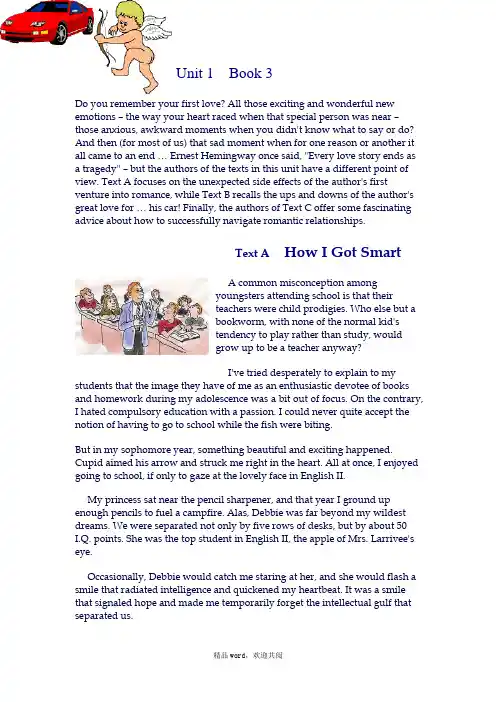
Unit 1 Book 3Do you remember your first love? All those exciting and wonderful new emotions – the way your heart raced when that special person was near –those anxious, awkward moments when you didn't know what to say or do? And then (for most of us) that sad moment when for one reason or another it all came to an end … Ernest Hemingway once said, "Every love story ends as a tragedy" – but the authors of the texts in this unit have a different point of view. Text A focuses on the unexpected side effects of the author's first venture into romance, while Text B recalls the ups and downs of the author's great love for … his car! Finally, the authors of Text C offer some fascinating advice about how to successfully navigate romantic relationships.Text A How I Got SmartA common misconception amongyoungsters attending school is that theirteachers were child prodigies. Who else but abookworm, with none of the normal kid'stendency to play rather than study, wouldgrow up to be a teacher anyway?I've tried desperately to explain to my students that the image they have of me as an enthusiastic devotee of books and homework during my adolescence was a bit out of focus. On the contrary, I hated compulsory education with a passion. I could never quite accept the notion of having to go to school while the fish were biting.But in my sophomore year, something beautiful and exciting happened. Cupid aimed his arrow and struck me right in the heart. All at once, I enjoyed going to school, if only to gaze at the lovely face in English II.My princess sat near the pencil sharpener, and that year I ground up enough pencils to fuel a campfire. Alas, Debbie was far beyond my wildest dreams. We were separated not only by five rows of desks, but by about 50 I.Q. points. She was the top student in English II, the apple of Mrs. Larrivee's eye.Occasionally, Debbie would catch me staring at her, and she would flash a smile that radiated intelligence and quickened my heartbeat. It was a smile that signaled hope and made me temporarily forget the intellectual gulf that separated us.I schemed desperately to bridge that gulf. Andone day, as I was passing the supermarket, an ideacame to me. A sign in the window announced thatthe store was offering the first volume of a set ofencyclopedias at the special price of 29 cents. Theremaining volumes would cost $2.49 each.I purchased Volume I -- Aardvark to Asteroid -- and began my venture into the world of knowledge. I would henceforth become a seeker of facts. I would become Chief Brain in English II and sweepmy princess off her feet with a surge of erudition.I had it all planned.My first opportunity came one day in thecafeteria line. I looked behind me and there shewas.“Hi,” she sai d.After a pause, I wet my lips and said, “Know where anchovies come from?”She seemed surprised. “No, I don't.”I breathed a sigh of relief. “The anchovy lives in salt water and is rarely found in fresh water.” I had to talk fast, so that I co uld get all the facts in before we reached the cash register. “Fishermen catch anchovies in the Mediterranean Sea and along the Atlantic coast near Spain and Portugal.”“How fascinating,” said Debbie, shaking her head in disbelief. It wasobvious that I had made quite an impression.A few days later, during a fire drill, I casuallywent up to her and asked, “Ever been to theAleutian Islands?”“Never have,” she replied.“Might be a nice place to visit, but I certainly wouldn't want to live there,” I said.“Why not?” said Debbie, playing right into my hands.“Well, the climate is forbidding. There are no trees on any of the 100 or more islands in the group. The ground is rocky and very little plant life can grow on it.”“I don't think I'd even care to visit,” she said.The fire drill was over and we began to file into the building, so I had to step it up to get the natives in. “The Aleuts are short and sturdy and have dark skin and black hair. They live on fish, and they trap blue foxes and seals for their valuable fur.”Debbie's eyes widened in amazement.One day I was browsing through the library. Ispotted Debbie sitting at a table, absorbed in acrossword puzzle. She was frowning, apparentlystumped on a word. I leaned over and asked if I couldhelp.“Four-letter word for Oriental female servant,” Debbie said.“Try amah,” I said, quick as a flash.Debbie filled in the blanks, then turned to stare at me in amazement. “I don't believe it,” she said. “I just don't believe it.”And so it went, that glorious, joyous, romantic sophomore year. Debbie seemed to relish our little conversations and hung on my every word.Naturally, the more I read, the more my confidencegrew.In the classroom, too, I was gradually making mypresence felt. One day, during a discussion ofColeridge's “The Ancient Mariner”, we came across theword albatross.“Can anyone tell us what an albatross is?” asked Mrs. Larrivee.My hand shot up. “The albatross is a large bi rd that lives mostly in the ocean regions below the equator, but may be found in the north Pacific as well. The albatross measures as long as four feet and has the greatest wingspread of any bird. It feeds on fish and shellfish. The albatross has an enormo us appetite, and when it's full it has trouble getting into the air again.”There was a long silence in the room. Mrs. Larrivee couldn't quite believe what she had just heard. I sneaked a look at Debbie and gave her a big wink.She beamed proudly and winked back.What I failed to perceive was that Debbie all thiswhile was going steady with a junior from aneighboring school -- a basketball player with a C+average. The revelation hit me hard, and for a while Ifelt like forgetting everything I had learned. I had savedenough money to buy Volume II --Asthma to Bullfinch-- but was strongly tempted to invest in a basketball instead.I felt not only hurt, but betrayed. Like Agamemnon, but with less drasticconsequences, thank God.In time I recovered from my wounds. The next yearDebbie moved from the neighborhood and transferred toanother school. Soon she became no more than a memory.Although the original incentive was gone, I continuedporing over the encyclopedias, as well as an increasing number of other books. Having tasted of the wine of knowledge, I could not now alter my course. For:“A little knowledge is a dangerous thing:Drink deep, or taste not the Pierian spring.”So wrote Alexander Pope, Volume XIV -- Paprika to Pterodactyl.斯蒂夫· 普罗迪上学的孩子们中间有一种普遍的错误想法,即认为他们的老师当年都是些神童。
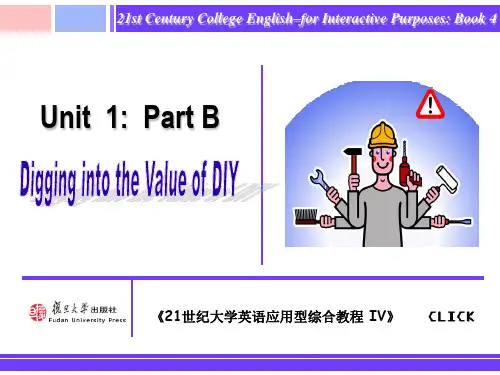
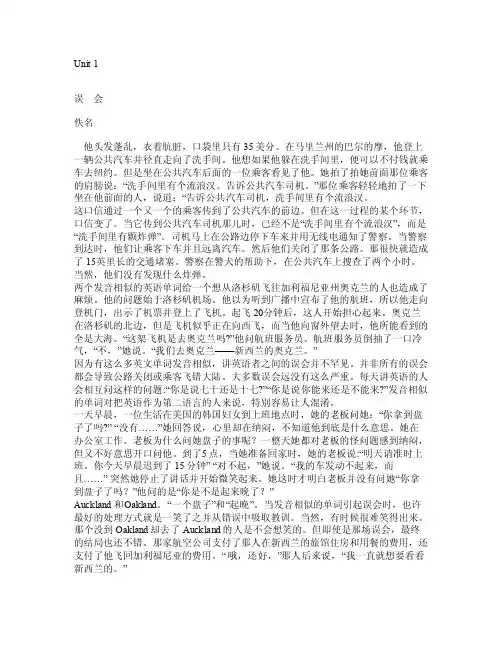
Unit 1误会佚名他头发蓬乱,衣着肮脏,口袋里只有35美分。
在马里兰州的巴尔的摩,他登上一辆公共汽车并径直走向了洗手间。
他想如果他躲在洗手间里,便可以不付钱就乘车去纽约。
但是坐在公共汽车后面的一位乘客看见了他。
她拍了拍她前面那位乘客的肩膀说:“洗手间里有个流浪汉。
告诉公共汽车司机。
”那位乘客轻轻地拍了一下坐在他前面的人,说道:“告诉公共汽车司机,洗手间里有个流浪汉。
这口信通过一个又一个的乘客传到了公共汽车的前边。
但在这一过程的某个环节,口信变了。
当它传到公共汽车司机那儿时,已经不是“洗手间里有个流浪汉”,而是“洗手间里有颗炸弹”。
司机马上在公路边停下车来并用无线电通知了警察。
当警察到达时,他们让乘客下车并且远离汽车。
然后他们关闭了那条公路。
那很快就造成了15英里长的交通堵塞。
警察在警犬的帮助下,在公共汽车上搜查了两个小时。
当然,他们没有发现什么炸弹。
两个发音相似的英语单词给一个想从洛杉矶飞往加利福尼亚州奥克兰的人也造成了麻烦。
他的问题始于洛杉矶机场。
他以为听到广播中宣布了他的航班,所以他走向登机门,出示了机票并登上了飞机。
起飞20分钟后,这人开始担心起来。
奥克兰在洛杉矶的北边,但是飞机似乎正在向西飞,而当他向窗外望去时,他所能看到的全是大海。
“这架飞机是去奥克兰吗?”他问航班服务员。
航班服务员倒抽了一口冷气,“不,”她说。
“我们去奥克兰——新西兰的奥克兰。
”因为有这么多英文单词发音相似,讲英语者之间的误会并不罕见。
并非所有的误会都会导致公路关闭或乘客飞错大陆。
大多数误会远没有这么严重。
每天讲英语的人会相互问这样的问题:“你是说七十还是十七?”“你是说你能来还是不能来?”发音相似的单词对把英语作为第二语言的人来说,特别容易让人混淆。
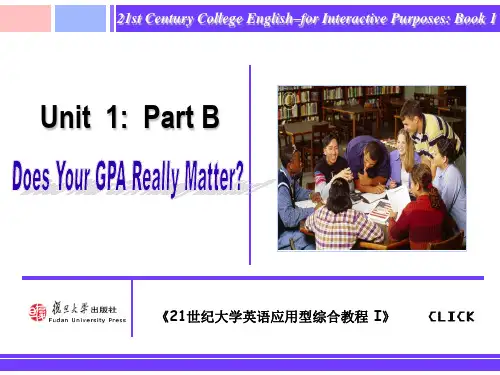
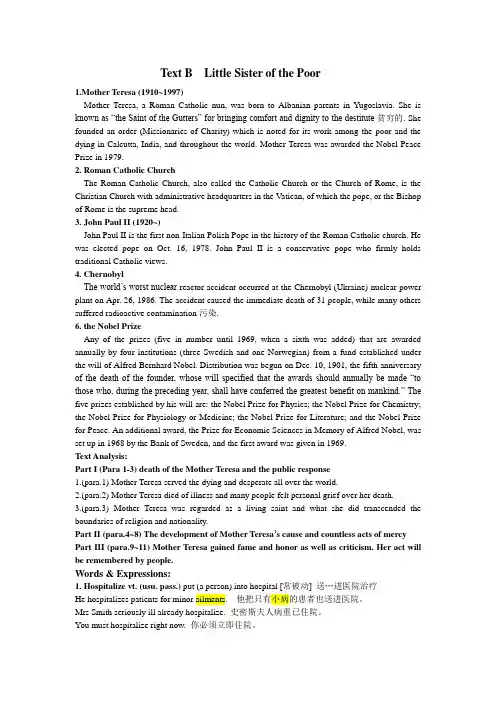
Text B Little Sister of the Poor1.Mother Teresa (1910~1997)Mother Teresa, a Roman Catholic nun, was born to Albanian parents in Yugoslavia. She is known as “the Saint of the Gutters” for bringing comfort and dignity to the destitute贫穷的. She founded an order (Missionaries of Charity) which is noted for its work among the poor and the dying in Calcutta, India, and throughout the world. Mother Teresa was awarded the Nobel Peace Prize in 1979.2. Roman Catholic ChurchThe Roman Catholic Church, also called the Catholic Church or the Church of Rome, is the Christian Church with administrative headquarters in the Vatican, of which the pope, or the Bishop of Rome is the supreme head.3.John Paul II (1920~)John Paul II is the first non-Italian Polish Pope in the history of the Roman Catholic church. He was elected pope on Oct. 16, 1978. John Paul II is a conservative pope who firmly holds traditional Catholic views.4. ChernobylThe world’s worst nuclear-reactor accident occurred at the Chernobyl (Ukraine) nuclear power plant on Apr. 26, 1986. The accident caused the immediate death of 31 people, while many others suffered radioactive contamination污染.6. the Nobel PrizeAny of the prizes (five in number until 1969, when a sixth was added) that are awarded annually by four institutions (three Swedish and one Norwegian) from a fund established under the will of Alfred Bernhard Nobel. Distribution was begun on Dec. 10, 1901, the fifth anniversary of the death of the founder, whose will specified that the awards should annually be made “to those who, during the preceding year, shall have conferred the greatest benefit on mankind.” The five prizes established by his will are: the Nobel Prize for Physics; the Nobel Prize for Chemistry; the Nobel Prize for Physiology or Medicine; the Nobel Prize for Literature; and the Nobel Prize for Peace. An additional award, the Prize for Economic Sciences in Memory of Alfred Nobel, was set up in 1968 by the Bank of Sweden, and the first award was given in 1969.Text Analysis:Part I (Para 1-3) death of the Mother Teresa and the public response1.(para.1) Mother Teresa served the dying and desperate all over the world.2.(para.2) Mother Teresa died of illness and many people felt personal grief over her death.3.(para.3) Mother Teresa was regarded as a living saint and what she did transcended the boundaries of religion and nationality.Part II(para.4~8) The development of Mother Teresa’s cause and countless acts of mercy Part III(para.9~11) Mother Teresa gained fame and honor as well as criticism. Her act will be remembered by people.Words & Expressions:1. Hospitalize vt. (usu. pass.) put (a person) into hospital [常被动] 送…进医院治疗He hospitalizes patients for minor ailments. 他把只有小病的患者也送进医院。
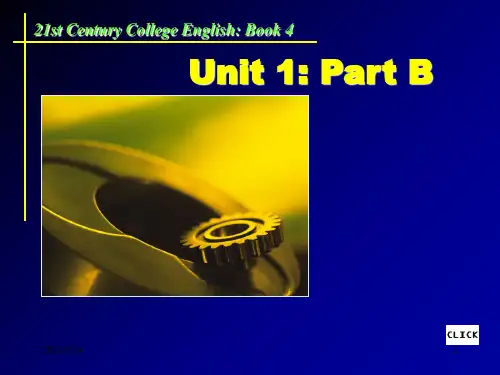
21世纪大学实用英语综合教程(第三册)教材Unit 1~8题后答案Unit 1 第一单元教材题后答案5. Fill in the blanks with the words given below. Change the forms where necessary.1. curious2. affects3. emergency4. locked5. Relatively6. complaining7. protested8. react9. mood 10. unique 11. consciousness 12. surgery6. Fill in the blanks with the expressions given below. Change the forms where necessary.1. the bottom line2. thanks to3. reflect on4. had lost touch5. went through6. followed around7. looking on8. woke up9. take action 10. after all10. 翻译Translate the following sentences into English. 1. Each time my brother complained about the difficulty of his work, I asked him to look on the bright side.2. The police reacted immediately when report came that two kids had been held up at gunpoint in a nearby building.3. When I pointed out the mistakes in her calculation, instead of correcting them as soon as possible, Mary protested that it was not her fault.4. Tom was curious about the joke I told my colleagues, but he didn’t get it.5. Thanks to his positive attitude, Jack took action and saved his own life before he lostconsciousness in the emergency room.6. When I reflect on what I have achieved in the past, I have to say that success comes from hard work. Th at’s the bottom line.Unit 2第二单元教材题后答案5. Fill in the blanks with the words given below. Change the forms where necessary.1. intense2. concept3. committed4. deserve5. selfish6. compromise7. matters8. opponent9. influence 10. effort 11. shortcuts 12. evidence6. Fill in the blanks with the expressions given below. Change the forms where necessary.1. work at2. According to3. run through4. in sight5. live with6. a variety of7. When it comes to8. live up to10. 翻译 Translate the following sentences into English.1. Take Michael Jordan, it’s easy for people to see his achievements while neglect the price of blood and sweat that he has paid on the court in order to come out on top.2. Right in the first English class, our teacher conveyed a clear message to us: as the basic building blocks of the language, new words must be memorized; any other shortcut is fool’s gold.3. Thousands of Chinese laborers contributed greatly to the construction of America’s first transcontinental railr oad, and their intense efforts deserve a page in American history.4. When it comes to training, the coach has no problem living with all sorts of complaints of the players but he never compromises with any of them.5. Traditional ethics seem especially important in some situations where the margin between right and wrong is as thin as an eggshell.6. As competition intensifies, our opponents and we are all working hard to live up to higher service standards.Unit 3第三单元教材题后答案5. Fill in the blanks with the words given below. Change the forms where necessary.1. withdraw2. opposite3. consult4. seeking5. chief6. frustrated7. gather8. suggestions 9. numerous 10. crucial 11. approval 12. yield6. Fill in the blanks with the expressions given below. Change the forms where necessary.1. give up on2. kicked out3. at the end of my rope4. count!-out5. provide!-wit6. that is7. on the brink of8. moved forward10. 翻译Translate the following sentences into English.1. The health report stresses the importance of fresh fruit and vegetables in our diet.2. I spent a whole week gathering the courage to say no to their request.3. These journeys made him realize to the fullest extent that many of the world’s species were on the brink of extinction.4. Approval of the patient’s family should be sought before doctors carry out such operations.5. Improved consumer confidence is crucial to an economic recovery.6. We gave up on the missing mountain climber after he had been missing for two weeks.Unit 4第四单元教材题后答案5. Fill in the blanks with the words given below. Change the forms where necessary.1. mankind2. determination3. burden4. define5. financial6. resources7. research 8. cure 9. evil 10. hardship 11. suicide 12. suffered6. Fill in the blanks with the expressions given below. Change the forms where necessary.1. broke down2. took!-for granted3. look!-in the eye4. couldn’t help but respect5. crying over6. no doubt7. dressing up8. slipped into9. 翻译 Translate the following sentences into English.1. He was no doubt a great hero so people couldn’t help but cry over his death.2. The actor used his celebrity status to fund research that might someday yield a cure for AIDS.3. The disabled man once considered suicide to relieve his family of the heavy burden.4. Children dress up as Superman to capture adults’ attention.5. It wasn’t until I matured that I realized I shouldn’t be afraid to look adversity and hardship in the eye.6. He could have easily stayed at home, for he had plenty of financial resources to keep him from worrying about medical bills..Unit 5第五单元教材题后答案5. Fill in the blanks with the words given below. Change the forms where necessary.1. discharged2. anger3. latter4. relationship5. engaged6. backgrounds7. miserable 8. invitation 9. match 10. folded 11. overseas 12. proposethe forms where necessary.1. broke down2. from time to time3. From the very beginning4. knocked down5. agreed to6. talk!-round7. due to8. give in9. in silence 10. go abroad10. 翻译 Translate the following sentences into English. 1. I just received a email in which Jessica expressed her regret of ending the relationship with her beloved boyfriend.2. She broke down at the loss of her family, and the impact of this miserable incident remained for the rest of her life.3. Both my parents object to my going abroad to further my studies. I wonder if I should give in or try to talk them round.4. Edgar was not good with words, so whenever Jessica vented her anger on him, he only endured it in silence.5. The cheerful background music matches his mood very well, for he’s just got engaged to his beloved girlfriend.6. From time to time the system would utter a piercing noise indicating its inability to run properly.Unit 6第六单元教材题后答案forms where necessary.1. rejected2. properly3. judgment4. employer5. lack6. feedback7. qualified8. suitable 9. candidate 10. confident 11. potential 12. punctual6. Fill in the blanks with the expressions given below. Change the forms where necessary.1. cope with2. miss out3. applied for4. keep!-in mind5. for a bit6. reflecting on7. fill out8. get back9. a variety of 10. To our amazement10. 翻译Translate the following sentences into English.1. Sometimes even if you are totally qualified for the job, you may still be rejected.2. You should learn to cope with difficult situation. And even more important, don’t look to others for help.3. To my shock/amazement, he was not only involved in a variety of extracurricular activities but also had applied for a part-time job.4. Keep in mind that one more failure is one step closer to success.5. Don’t dwell on the reasons that are out of your control, because this job doesn’t entirely suit you and your chances are slim.6. Although you may not always like to hear negative feedback, whatever you do, don’t burn your bridges.Unit 7第七单元教材题后答案5. Fill in the blanks with the words given below. Change the forms where necessary.1. tuition2. anxiety3. horrors4. switched5. quarter6. steady7. roughly8. prospects 9. disorder 10. represent 11. apparent 12. population6. Fill in the blanks with the expressions given below. Change the forms where necessary.1. were booked up2. not getting anywhere3. ups and downs4. burst out5. get along with6. broke up with7. in advance8. had no choice9. In spite of 10. take your own life10. 翻译Translate the following sentences into English.1. The students who seek psychological counseling represent only the tip of the iceberg. Most students endure the stress in silence.2. The horror movie overwhelmed him so much that he began to suffer from a sleeping disorder, even insomnia.3. Lisa had always been a straight-A student until her junior year, when she had to hold down two part-time jobs to pay her tuition.4. In spite of the result of the aptitude test, John decided to switch his major from accounting to psychology.5. He would rather remain a sales clerk, apparently because he prefers a steady life to a life full of ups and downs.6. The computer has broken down on more than one occasion. Isn’t that enough for professional helpUnit 8第八单元教材题后答案5. Fill in the blanks with the words given below. Change the forms where necessary.1. chemical2. soil3. disturb4. mixture5. substance6. ruin7. consumers8. stable9. pollution 10. supplies 11. decay 12. main6. Fill in the blanks with the expressions given below. Change the forms where necessary.1. leaked out2. due to3. are known as4. depend on5. giving off6. make up7. live on 8. have used up10. 翻译 Translate the following sentences into English.1. With the construction of the nuclear power plant, this city now doesn’t have to worry about its own electricity supply. Instead, it can supply electricity to other cities nearby.2. These vegetables do not decay when kept at a relatively stable low temperature.3. This city is known as the financial center of the country. The development of its economy depends heavily on banking and foreign trade.4. This plant only lives on the top of certain high mountains and gives off a very sweet smell in spring.5. The main cause of thi s area’s water pollution i the chemical substance that leaks out of a paper mill by the river bank.6. This kind of litter is made up of a mixture of chemical waste. It has poisoned the soil, ruining it completely.。
Who Is Great?Michael RyanAs a young boy, Albert Einstein did so poorly in school that teachers thought he was slow. The young Napoleon Bonaparte was just one of hundreds of artillery lieutenants in the French Army. And the teenage George Washington, with little formal education, was being trained not as a soldier but as a land surveyor.Despite their unspectacular beginnings, each would go on to carve a place for himself in history. What was it that enabled them to become great? Were they born with something special? Or did their greatness have more to do with timing, devotion and, perhaps, an uncompromising personality?For decades, scientists have been asking such questions. And, in the past few years, they have found evidence to help explain why some people rise above, while others—similarly talented, perhaps—are left behind. Their findings could have implications for us all.Who is great? Defining who is great depends on how one measures success. But there are some criteria. "Someone who has made a lasting contribution to human civilization is great," said Dean Keith Simonton, a professor of psychology at the University of California at Davis and author of the 1994 book Greatness: Who Makes History and Why. But he added a word of caution: "Sometimes great people don't make it into the history books.A lot of women achieved great things or were influential but went unrecognized."In writing his book, Simonton combined historical knowledge about great figures with recent findings in genetics, psychiatry and the social sciences. The great figures he focused on include men and women who have won Nobel Prizes, led great nations or won wars, composed symphonies that have endured for centuries, or revolutionized science, philosophy, politics or the arts. Though he doesn't have a formula to define how or why certain people rise above (too many factors are involved), he has come up with a few common characteristics.A "never surrender" attitude. If great achievers share anything, said Simonton, it is an unrelenting drive to succeed. "There's a tendency to think that they are endowed with something super-normal," he explained. "But what comes out of the research is that there are great people who have no amazing intellectual processes. It's a difference in degree. Greatness is built upon tremendous amounts of study, practice and devotion."He cited Winston Churchill, Britain's prime minister during World War II, as an example of a risk-taker who would never give up. Thrust into office when his country's morale was at its lowest, Churchill rosebrilliantly to lead the British people. In a speech following the Allied evacuation at Dunkirk in 1940, he inspired the nation when he said, "We shall not flag or fail. We shall go on to the end...We shall never surrender."Can you be born great? In looking at Churchill's role in history —as well as the roles of other political and military leaders—Simonton discovered a striking pattern: "Firstborns and only children tend to make good leaders in time of crisis: They're used to taking charge. But middle-borns are better as peacetime leaders: They listen to different interest groups better and make the necessary compromises. Churchill, an only child, was typical. He was great in a crisis, but in peacetime he was not effective—not even popular."Timing is another factor. "If you took George Washington and put him in the 20th century he would go nowhere as a politician," Simonton declared. "He was not an effective public speaker, and he didn't like shaking hands with the public. On the other hand, I'm not sure Franklin Roosevelt would have done well in Washington's time. He wouldn't have had the radio to do his fireside chats."Can you be too smart? One surprise among Simonton's findings is that many political and military leaders have been bright but not overly so. Beyond a certain point, he explained, other factors, like the ability to communicate effectively, become more important than innate intelligence as measured by an IQ test. The most intelligent U.S. Presidents, for example—Thomas Jefferson, Woodrow Wilson and John F. Kennedy—had a hard time getting elected, Simonton said, while others with IQs closer to the average (such as Warren G. Harding) won by landslides. While political and economic factors also are involved, having a genius IQ is not necessary to be a great leader.In the sciences, those with "genius level" IQs do have a better chance at achieving recognition, added Simonton. Yet evidence also indicates that overcoming traditional ways of thinking may be just as important.He pointed to one recent study where college students were given a set of data and were asked to see if they could come up with a mathematical relation. Almost a third did. What they did not know was that they had just solved one of the most famous scientific equations in history: the Third Law of Planetary Motion, an equation that Johannes Kepler came up with in 1618.Kepler's genius, Simonton said, was not so much in solving a mathematical challenge. It was in thinking about the numbers in a unique way—applying his mathematical knowledge to his observations of planetary motion. It was his boldness that set him apart.Love your work. As a child, Einstein became fascinated with the way magnets are drawn to metal. "He couldn't stop thinking about this stuff," Simonton pointed out. "He became obsessed with problems in physics by thetime he was 16, and he never stopped working on them. It's not surprising that he made major contributions by the time he was 26.""For most of us, it's not that we don't have the ability," Simonton added, "it's that we don't devote the time. You have to put in the effort and put up with all the frustrations and obstacles."Like other creative geniuses, Einstein was not motivated by a desire for fame, said Simonton. Instead, his obsession with his work was what set him apart.Where such drive comes from remains a mystery. But it is found in nearly all creative geniuses—whether or not their genius is acknowledged by contemporaries."Emily Dickinson was not recognized for her poetry until after her death," said Simonton. "But she was not writing for fame. The same can be said of James Joyce, who didn't spend a lot of time worrying about how many people would read Finnegans Wake."Today, researchers have evidence that an intrinsic passion for one's work is a key to rising above. In a 1985 study at Brandeis University conducted by Teresa Amabile, now a professor of business administration at Harvard University, a group of professional writers—none famous—were asked to write a short poem. Each writer was then randomly placed in one of three groups: One group was asked to keep in mind the idea of writing for money; another was told to think about writing just for pleasure; and a third group was given no instruction at all.The poems then were submitted anonymously to a panel of professional writers for evaluation. The poetry written by people who thought about writing for money ranked lowest. Those who thought about writing just for pleasure did the best. "Motivation that comes from enjoying the work makes a significant difference, "Amabile said.当阿尔伯特.爱因斯坦是个小男孩的时候,他在学校里的成绩很差,老师们都觉得他反应迟钝。
21世纪大学英语读写教程(第二册)课文翻译及课后答案第一单元UNIT1翻译TEXT A温斯顿?丘吉尔——他的另一种生活玛丽?索姆斯我的父亲温斯顿?丘吉尔是在40几岁开始迷恋上绘画的,当时他正身处逆境。
1915年,作为海军大臣,他深深地卷入了达达尼尔海峡的一场战役。
原本那次战役是能够缩短一场血腥的世界大战的,但它却失败了,人员伤亡惨重,为此丘吉尔作为公务员和个人都付出了代价:他被免去了海军部的职务,失去了显赫的政治地位。
“我本以为他会因忧伤而死的。
”他的妻子克莱门泰因说。
被这一不幸压垮的他同家人一起退隐到萨里郡的一个乡间居处---耘锄农场。
在那儿,正如丘吉尔日后所回忆的,“绘画女神拯救了我!”一天他正在花园里漫步,正巧碰上他的弟妹在用水彩画素描。
他观看了她几分钟,然后借过她的画笔,试了一下身手----于是缪斯女神施展了她的魔法。
自那天以后,温斯顿便爱上了绘画。
任何能让沉浸在忧思中的温斯顿分心的事情都让克莱门泰因高兴。
于是,她赶紧去买来她所能找到的各种颜料和画具。
水彩颜料、油画颜料、纸张、帆布画布---很快耘锄农场里便堆满了一个绘画者可能想要或需要的各样东西。
画油画最终成了温斯顿的一大爱好---但是最初几步却出奇地艰难。
他凝视着他的第一块空白画布,异乎寻常地紧张。
他日后回忆道:“我迟疑不决地选了一管蓝色颜料,然后小心翼翼地在雪白的底子上的画上蚕豆般大小的一笔。
就在这时,我听到车道上传来一辆汽车的声音,于是惊恐地丢下我的画笔。
当我看清是谁从汽车里走出来时,更是惊慌失措。
来者正是住在附近的着名画家约翰?莱佛利爵士的妻子。
“‘在画画呢!’她大声说道。
‘多么有趣。
可你还在等什么呢? 把画笔给我---大的那支。
’她猛地用笔蘸起颜料,还没等我缓过神来,她已经挥笔泼墨在惊恐不已的画布上画下了有力的几道蓝色。
谁都看得出画布无法回击。
我不再迟疑。
我抓起那支最大的画笔,迅猛异常地向我可怜的牺牲品扑了过去。
自那以后,我再也不曾害怕过画布。
21世纪大学英语读写教程(第三册)Unit 1-4 ABC课文翻译Unit 1 Text A 我怎么变聪明的斯蒂夫·普罗迪上学的孩子们中间有一种普遍的错误想法,即认为他们的老师当年都是些神童。
不管怎么说,除了不像一般孩子那样生性贪玩、不愿学习的书呆子之外,还有谁愿意长大后当老师呢?我竭力向我的学生们解释我在他们心目中的形象---- 一个在青春期热衷于书本和作业的人---- 有一点被扭曲了。
相反,我极为憎恨义务教育。
我永远都无法接受在鱼儿上钩时不得不去上学的想法。
但是,在我中学二年级的时候,发生了一件美妙而又激动人心的事。
爱神丘比特瞄准他的箭,正好射中了我的心。
突然间,我喜欢上学了,而这只是为了能够凝视英语二班里那张可爱的脸。
我的公主坐在卷笔器旁边,那一年我削的铅笔足以点燃一堆篝火。
可黛比却远远超出了我的期望。
将我们隔开的不仅有五排课桌,还有约50分的智商。
她是英语二班的尖子,拉里维太太的掌上明珠。
偶尔,黛比会发觉我在盯着她看,这时她便会露出一个闪烁着智慧光芒,令我心跳加快的微笑。
这是一个标志着希望、使我暂时忘记将我们分开的智力上的鸿沟的微笑。
我想尽办法去跨越那条鸿沟。
有一天,我经过超市,突然想到了一个主意。
橱窗里的一块广告牌称商店正以29美分的特价供应一套百科全书的第一卷。
其余各卷则为每卷2.49美元。
我买下了第一卷---- 从Aardvark(土豚)到Asteroid(海星)---- 然后开始了在知识世界中的冒险历程。
打那以后,我将成为一个事实探寻者。
我将成为英语二班的首席智者,以渊博的知识使我的公主倾心于我。
我全都计划好了。
一天,在自助餐厅排队时,我的第一个机会来了。
我往身后一看,她正好在那儿。
“嘿,”她说。
我犹豫了一下,然后润了润嘴唇说,“知道凤尾鱼是从哪儿来的吗?”她显得有点惊讶。
“不,我不知道。
”我松了口气。
“凤尾鱼生活在咸水里,淡水里很少见。
”我不得不讲得很快,以便在我们到达收银台之前,道出所有的细节。
Text B Little Sister of the Poor1.Mother Teresa (1910~1997)Mother Teresa, a Roman Catholic nun, was born to Albanian parents in Yugoslavia. She is known as “the Saint of the Gutters” for bringing comfort and dignity to the destitute贫穷的. She founded an order (Missionaries of Charity) which is noted for its work among the poor and the dying in Calcutta, India, and throughout the world. Mother Teresa was awarded the Nobel Peace Prize in 1979.2. Roman Catholic ChurchThe Roman Catholic Church, also called the Catholic Church or the Church of Rome, is the Christian Church with administrative headquarters in the Vatican, of which the pope, or the Bishop of Rome is the supreme head.3.John Paul II (1920~)John Paul II is the first non-Italian Polish Pope in the history of the Roman Catholic church. He was elected pope on Oct. 16, 1978. John Paul II is a conservative pope who firmly holds traditional Catholic views.4. ChernobylThe world’s worst nuclear-reactor accident occurred at the Chernobyl (Ukraine) nuclear power plant on Apr. 26, 1986. The accident caused the immediate death of 31 people, while many others suffered radioactive contamination污染.6. the Nobel PrizeAny of the prizes (five in number until 1969, when a sixth was added) that are awarded annually by four institutions (three Swedish and one Norwegian) from a fund established under the will of Alfred Bernhard Nobel. Distribution was begun on Dec. 10, 1901, the fifth anniversary of the death of the founder, whose will specified that the awards should annually be made “to those who, during the preceding year, shall have conferred the greatest benefit on mankind.” The five prizes established by his will are: the Nobel Prize for Physics; the Nobel Prize for Chemistry; the Nobel Prize for Physiology or Medicine; the Nobel Prize for Literature; and the Nobel Prize for Peace. An additional award, the Prize for Economic Sciences in Memory of Alfred Nobel, was set up in 1968 by the Bank of Sweden, and the first award was given in 1969.Text Analysis:Part I (Para 1-3) death of the Mother Teresa and the public response1.(para.1) Mother Teresa served the dying and desperate all over the world.2.(para.2) Mother Teresa died of illness and many people felt personal grief over her death.3.(para.3) Mother Teresa was regarded as a living saint and what she did transcended the boundaries of religion and nationality.Part II(para.4~8) The development of Mother Teresa’s cause and countless acts of mercy Part III(para.9~11) Mother Teresa gained fame and honor as well as criticism. Her act will be remembered by people.Words & Expressions:1. Hospitalize vt. (usu. pass.) put (a person) into hospital [常被动] 送…进医院治疗He hospitalizes patients for minor ailments. 他把只有小病的患者也送进医院。
Mrs Smith seriously ill already hospitalize. 史密斯夫人病重已住院。
You must hospitalize right now. 你必须立即住院。
plain v 1.~of/about sth: tell others that sth is making you feel ill不满,埋怨He complained of headache.She’s been complaining of a bad back recently.The patient is complaining of acute earache.2.~to sb: tell formally that sth is wrong 抱怨, 诉苦, 埋怨,You can complain to the manger if the service is poor here.She’d complained to the police if we made any more noise.My sister is always complaining to me of her heavy schoolwork.complaint n不满,投诉, 控告3. Summon vt. ~ sb to sth; ~ sb together request or order sb to come 召唤,传唤The police summoned the witness. 警察传证人。
They summoned (up) their courage to meet the deadline.他们努力要在终止日期前完工。
He was summoned to appear in court as a witness. 他被传唤出庭作证。
He came downstairs and summoned her to his study. 他下楼将她叫到书房去。
They had to summon a second conference and change the previous decision.他们不得不召集第二次会议,改变以前的决定。
Summon the pupils together in the school hall.The shareholders were summoned by my boss to a general meeting.I was summoned by my boss (to explain my actionsSummon the pupils together in the school hall.4. street people:people living in slums who, esp. during the summer, spend much of their time sitting on building steps, standing on the sidewalk talking, or visiting neighbors and local stores; the local people of a crowded neighborhood. 街头流浪者4. gesture n 1.expressive movement of a part of the body, esp the hand or head姿势,手势make a rude gesture with a gesture of despair communicating by gesture2. ~ sth (to sb) convey sth by making gestures 姿态,表示(尤指友好的表示)。
She gestured her disapproval.He gestured (to me) that it was time to go.He gestured to them to keep quiet5. Abandon vt. desert; leave completely and for ever 抛弃;放弃abandon a friend in trouble.抛弃处于危难中的朋友abandon one’s idea放弃自己的想法He abandoned his wife and child.他遗弃了他的妻子和孩子。